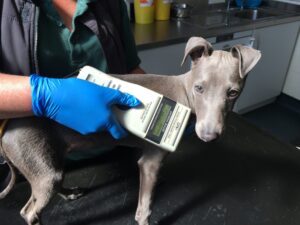How Do Dog Microchips Work?
Your dog’s microchip carries a number unique to your pet, which is registered with a database. This holds details about your pet, as well as your own contact details, which is a godsend should your pet get lost and picked up as a stray. Studies have even been conducted to prove the effectiveness of microchips in successfully reuniting lost pets with their owners, something we see often at the Home.
In the grand scheme of things, microchipping is still a fairly new form of pet identification. Fortunately though, through ease of availability and changes in both attitude and legislation, it is one that has been widely adopted. PDSA’s 2018 PAW Report states that 91% of UK dogs are currently chipped, up from 70% in 2011. That does, however, still leave nearly one in 10 dogs without a microchip.
